#Views of Tirana
Explore tagged Tumblr posts
Text

Tirana_from_South.jpg
#wikimedia commons#2010s#2015#Views of Tirana#The Grand Lake Park of Tirana#Tirana Artificial Lake#2015 in Tirana#Urbanisation in Albania#License migration redundant#GFDL#CC-BY-SA-3.0#CC-BY-SA-2.5#CC-BY-SA-2.0#CC-BY-SA-1.0#Self-published workFiles by User:Albinfo
2 notes
·
View notes
Text

16 notes
·
View notes
Text

25 notes
·
View notes
Photo

View of Tirana with the mountains in the background.
#Tirana#Tirane#albania#balkantrip#balkan#travel#trip#travelphotography#travelphoto#travellingman#photography#myway#panoramicview#cityscape#canontop#canonphoto#canon70200mm#visitalbania#atmosphere#view#awesome_earthpix#shotzdelight#hobbyphotography#magyarfotosok
0 notes
Text

View from Dajti Ekspres upper station, Tirana, Albania
25 notes
·
View notes
Text
Tirana… exploring Europe's North Korea
Tirana… exploring Europe's North Korea For decades, Albania was shrouded in mystery, its borders sealed off from the world. Today, it stands as a testament to resilience and transformation and is finally inviting travellers to uncover its hidden gems.
Tirana For decades, Albania was shrouded in mystery, its borders sealed off from the world. Today, it stands as a testament to resilience and transformation and is finally inviting travellers to uncover its hidden gems. At the heart of the country is its vibrant capital city, Tirana; a city that is forcing it’s way into the modern world with skyscrapers bursting out all over its growing…

View On WordPress
#Air Albania Stadium#Albania#Berat#Berat Castle#blog#Bunk&039;Art#Bunk&039;Art 2#Ceren Ismet Shehu#city#Communism#complete#Enver Hoxha#Et-hem Bej Moswue#Europe#Foodie#Gorica Bridge#Lin#Lin bunker#Lin Village#Mosaic of the Ancient Basilica of Lin#Nuclear Bunkers#Pyramid of Tirana#Resurrection of Christ Orthodox Cathedral#Skanderbeg Square#Statue of Skanderbeg#The Cloud#Tirana#Tirana Castle#travel#travelblog
2 notes
·
View notes
Text
SOCKS AND BUSKINS: ENSTARS OCS UNIT!:
Okay, okay. So it's a three unit group that had theater motifs, each song is supposed to be a story and deal with comedy/tragedy (hence the name). The unit members are José Díaz(Silent King), Sierra Rivera (Double-faced Queen), and "Frecil" Frederico Rivera(Blind Jester).
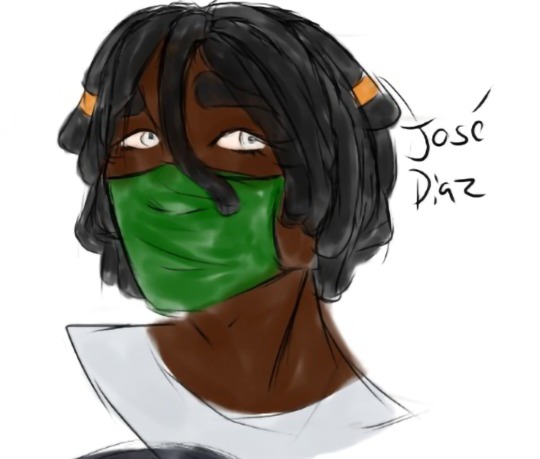
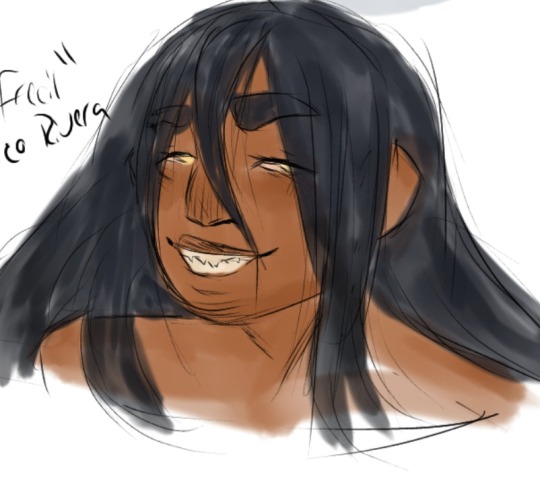
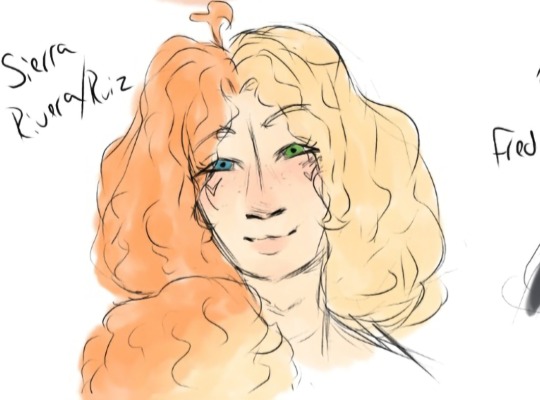
I'm still trying to figure out the uniforms for the unit, but I'm thinking of basing it off the fairy court from Midsummer's night (Oberan, Tirana, and Puck) or something similar to that aspect. Keep switching between light greens/earth tones and more royal colors. All I know is that each unit member will have some motifs for their character that they play.
Each song is supposed to tell a story—first starting off with one of the characters (Jester, Queen, or King) setting the stage and telling the audience what they think is happening verus what's actually happening. Much like a musical or play. Each character has a different point of view of each event/past songs, and it changes from either tragic to comedic really quickly. I want to explore the relationship between tweaking a story/how comedy and tragedy are linked/etc. And how easy it is to change the perceptive.
Funny enough, all the idols in this unit are trans—I didn't realized this until a few weeks ago.
Also, disabled as well—José has a arm prosthetic and is selective mute while Frecil is legally blind. This does cause some issues with getting shows done, it just means that they have to do things a little differently. Something I'm willing to explore more.
Sierra has a hearing aid, but I need to do more research into hearing aids/hearing loss—so please be patient with me^^!
The Silent King and The Blind Jester are supposed to be semi-foils. The story of Socks and Buskins is still being fleshed out atm.
José is actually the writer for the story with Frecil being the co-writer. Frecil composes the music and Sierra does the choreography.
The unit was founded by both Frecil and José. Despite Frecil being very, very, experienced in the idol world—they gave the leadership/"King" position to José. Frecil acts more like a guide/mentor towards José and sometimes Sierra. Sierra and Frecil are recent step-siblings (both their mothers met due to the creation of the unit, yes its hell)
Aela "Cherry" Barbasdotter is their sole producer. She's been with the unit since near the start of its creation and damn, very very overprotective to the point that its suffocating.

Anyway, that's it so far~! I'm really excited to, well, get character sheets down for these guys~! I've been working on them for quite a while, and kinda just upped the silliness/antics a bit more due to the media being—well— Enstars. Also, I wanted to touch roots with my amateur theater kid sooo~!
#enstars oc#enstars idols unit ocs#cherry#aela barbasdotter#frecil#frederico rivera#sierra rivera#josé diaz#my ocs#enstar oc unit: socks and buskins
13 notes
·
View notes
Text
Saimir Kristo: Architecture Is The Means To Create A Common Language Of Living
Weltraum, a radio podcast about space on the jabbering Independent Coastal Radio NOR hosted Saimir Kristo ... I had this great opportunity to talk about the city, his ideals and thoughts.

Saimir Kristo | Photo © Kristiana Meço
How Tirana changed in last 20 years?
Saimir Kristo: Talking about the weather it was much more rainy. It used to be the rainy city in Albania twenty years ago, when I come back from Greece. It changed radically. In 2004 there were not even proper bars. Of course nobody cared about the bars in that time, the country was just going out of a difficult period from the civil war in 1997, where pyramid schemes tricked citizens and took away their money. Fifteen years ago I am not really sure if we were not able to escape from this closed territorial system but today is the other problem, that people are leaving, there are massive emigrations. The problem I face as an individual but also as an architect in the last twenty years working in remote areas of Albania.
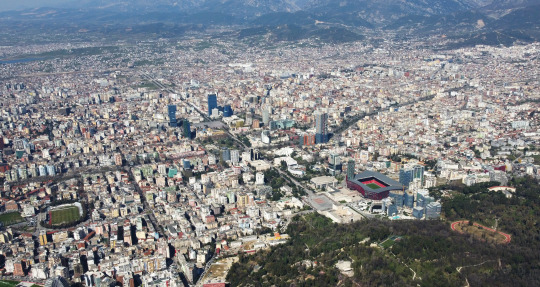
Tirana Aerial View | Photo © Open House Tirana
When I come back there was this amazing energy where people from Albania want to change the country, they wanted to go out from those enclaves from the past. There were many cases of informality in the 1990s, many cases of wild development, but there were people with the amazing energy. Whenever we have problems and we have the energy, we can always solve all problems because we have people around to solve it together. What about if you have depth and you go to the rural areas of Albania? Those villages were very much present in the landscape of the county but today are almost empty. Villages of once 1.000 inhabitants have now only thirteen people.
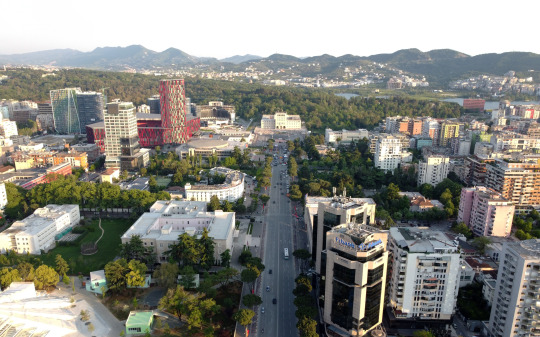
Tirana New Boulevard | Photo © Open House Tirana
The intention to move into big urban centres in the 1990s was very huge, it was a huge mass immigration. Today it's starting again. When I moved to Tirana there was just almost a half of a million people, reaching today a number of one million. So from 2,5 million Albanians that have left the county one million lives between Tirana and Durrës, the main port city. And we have 29.000 km2 of the territory. This is an important way to speak how Albania changed.
It is not always about architecture?
SK: I think is barely about the architecture. Architecture it is the means to justify, to camouflage, to improve and to manifest that people are much more sensitive about it. It is the means to deconstruct mentalities but also a means to educate to improve the settings and create a common language of living, of being. All these years of architecture in Albania, not as innovative approach because if was used in a part, is used in a way to transfer the identity of the city. I have a very famous image in mind, in 1990 when the main Skanderberg square had only pedestrians, only one bus and one truck.

Skanderbeg Square during daytime.| Photo © Open House Tirana
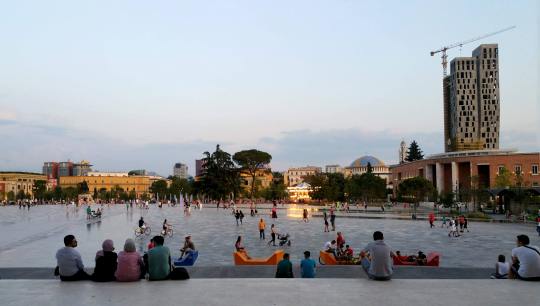
Skanderbeg Square changes it's identity during the evening.| Photo © Open House Tirana
Architecture is the means to justify, to camouflage, to improve and to manifest that people are much more sensitive about it. It is the means to deconstruct mentalities but also a means to educate to improve the settings and create a common language of living, of being.
People were thinking we had a very organised square with the right amount of people (whatever that means), a public transport with one bus. What if we go back to this situation? That can be very dangerous, because the Skanderberg square didn't had cars because people didn't want to use cars but because no one have a car easily. People also didn't feel the square as a public space but a main space for demonstration of the propaganda of the authoritarian regime of Hoxha. In the same way are the public spaces today, they might seem more contemporary organised but they are made only for events, either a political meeting, music concert or sports gather.
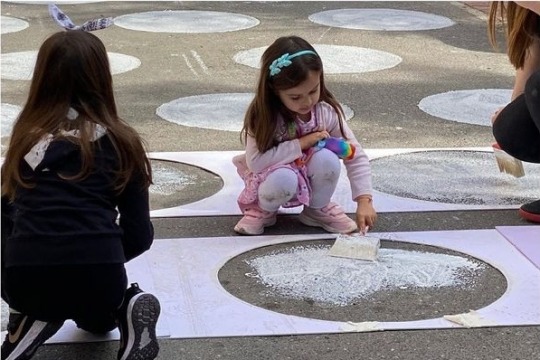
Urban Streetscapes: Filter Caffee Filtre | Photo © Tirana Architecture Triennial
The real life in squares makes them lively after midnight or early morning, where there is no urgency to be there but just a pure pleasure or desire. Architecture was and it still used to express political dominance and authority. To have a beautiful architecture we have to present it and experiment. I don't like the word educate, I think to have this relationship of co-ownership of projects that people really want.
The real life in squares makes them lively after midnight or early morning, where there is no urgency to be there but just a pure pleasure or desire.
As an educator you work in an educational institution, how is educational system about architecture in Albania functioning?
SK: It is situated on a dogma of the repetitive reproduction of something before, which is also linked to today, because students tend to limit their creativity because of the restrict educational system and their project doesn't resemble the project of their professors. This is a problem of us, educators. We have to change that. We continue to teach students what we were thought twenty, thirty years ago. We need to transform radically they way we do it. We shall focus on the importance of reading, going in depth of students ideas and expressions. Then students can find right tools to express better. We always try to copy what is present as innovative. It is on us, professors to educate ourselves more, read more and listen more. This is the the problem of architects, they don't listen so much but tend to speak.
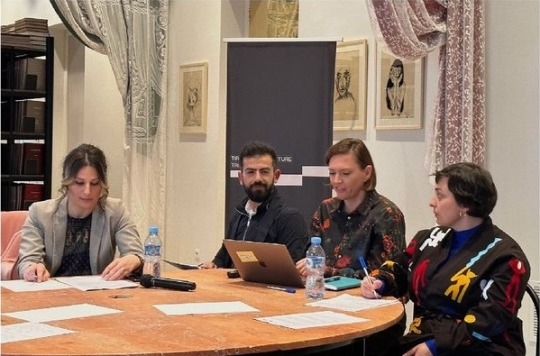
Roundtable Virtual or Physical; from left to right Etleva Dobjani, Saimir Kristo, Dijana Vučinić, Tinatin Gurgenize. | Photo © Tirana Architecture Triennial
The other topic, which I am very critical about, is the issue of non payed work. This has became a standard. We teach students to be aware of how much they need to be payed to be able to value their work. These are things that were never talked before in the auditorium.
Maybe LINA is the good opportunity for that; what did LINA created for Bartleti?
SK: Some of our LINA fellows presented the issue of inclusivity and education, which makes me very proud of. For Bartleti LINA collaboration makes a very important presence for bringing fresh ideas from incredible fellows with a high level of integrity and professionalism. On the other side this enhanced courage to our students to work with these topics and collaborate with the others. It is a case of asking question in a classroom and feeling a prejudice why are you asking this question. If you see other people having the same question, the you are part of the community. The other important issue is a continuous collaboration with other institutions that are part of LINA. I always have called this more that European union of architecture, because it extends beyond Europe.

Space Saloon + The MAAK | Photo © Tirana Architecture Triennial
International collaboration can not only be used as a mean to justify but can also be used as a means to go further, to look beyond and investigate a very delicate problem. Last year we had an opportunity to host New South with the issue of Sacred grounds.

Sacred Grounds by New South. | Photo © Tirana Architecture Triennial
We have this phenomenon of reduced co-existance in Albania. We have four different religions, which all cohabitate together. This is because our dictator abroad the religion in the 1960s, so when there was no religion, they need to find a common language to keep their faith inside them. In the New South's installation in the National historic museum, the most dictatorial building in Albania, presented all these four religion and in such way created a non physical temple for people of all these four religions inside an extra dogmatic building. We try to touch not only the build aspect but also how we perceive the space.
What kind of act is the demolishment of the National Theatre of Albania that happened few years ago?
SK: The demolition of the National Theatre was a collective act. It was not just an act to build a new theatre. It is not only an act by the government to transform a public space, get read of the old building or neglect it' s value. I think it's an act of us as architects, us as citizens of Tirana, not to raise the attention to all other historical buildings that have been left to the mercy of time since thirty years now. It is something we need to reflect in our consciousness. We might not have the money to restore the building, as culture is the smallest portfolio in our government. We have to ask for more. Demolitions is not something sporadic, that happened with the theatre, this is happening with hundred of historical buildings in Tirana and all around Albania. (Saimir presented the Forgotten Masterpieces of Albania in some of our previous talks).
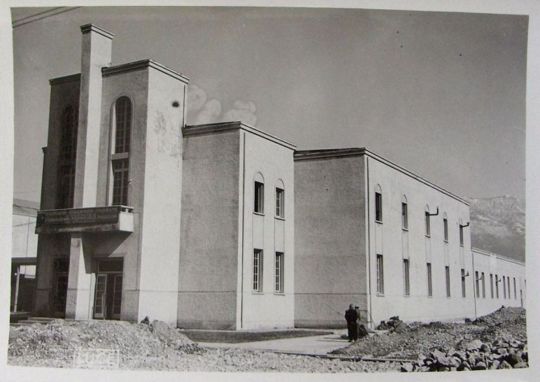
The National Theatre in Tirana. | Photo via Architectuul
We are always there in the last moment, when we know that there is one percent of chance to save it. We should emphasise the importance of thesis buildings and find a way to restore them. The city from twenty years ago it's not recognisable today. This is telling a lot about us, because to rebuild and restore takes a lot more time to discuss and work on that. In many levels the case of theatre is a consume story but it's also an inflation of our society and at the end you have one more building less to admire. The 17th of May 2020 at 4:30 in the morning, that's when the theatre collapsed, should not be the moment to ask the old theatre to be rebuild again in the place of the old one, but should be a moment to commemorate how neglected we were as a society and how important is to turn the attention on the city that we are taking advantage of.

Northern Boulevard Extension | Photo © Open House Tirana
The memory of the city is always important and we need to be able to pass over the memory of the story of the historical theatre to the next generations and not to romanticise the idilic idea of a new theatre by BIG. It is important of how to show the identity of our city.
How do you see architecture in the future?
SK: Beautiful! Why not! I am not part of the dramatic and pessimist discussions that architecture and our cities are getting worse. We have students that are not compromising themselves and they want to do a change. I want to Wellcome all the changes to see myself as a part of this evolving system. With new students working in the field of architecture we just have a bright future. What we need is to embrace all these things to feel them. We have to open our minds and to wake up. We have to keep the dream of our inner small Chile inside and working in architectural education we are responsible to keep that dream of all these young students alive and we have to foster it.
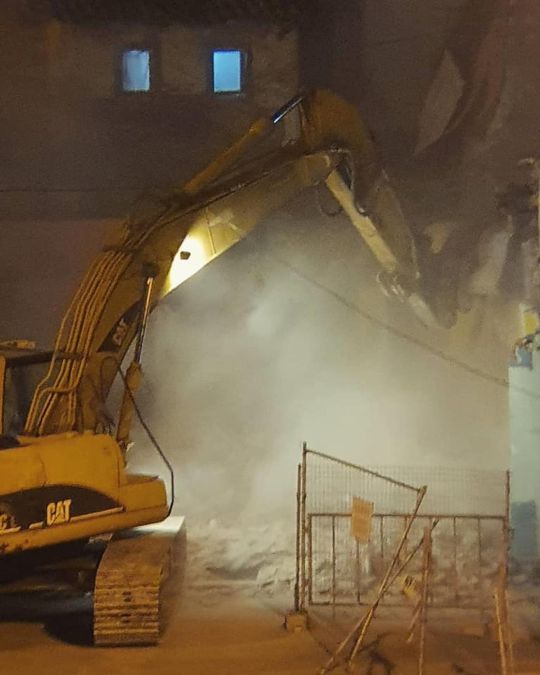
The National Theatre of Albania was demolished on 17. May 2020 at 4am. | Photo © Saimir Kristo
Saimir Kristo, P.hD. is an architect and urban designer, currently Deputy Dean and Lecturer at the Faculty of Applied Sciences and Creative Industries at BARLETI University. Founder of Tirana Architecture Triennale - Architecture Fund in Albania and Open House Tirana. He is an APLS Alumnus invited by the Austrian Ministry of Foreign Affairs and IVLP Alumnus invited by the US State Department representing civil society in Albania. As an active member of civil society, he is engaging communities to develop a common educational platform in the field of architecture and urban planning. His professional practice IXI Architecture is working in tangible and intangible mediums to transform urban design and architecture in Albania for the better. He holds a Ph.D. in Architecture and Urban Planning Focused on city morphology and urban catalysis and their role in the transformation of public spaces, a research result of his experience as a project leader in Urban Regulatory Plans in Albania. His scientific activity extends with monographs and publications but also as a jury member in international competitions. He serves as the Independent Nominator for the “EU Mies van der Rohe Award” appointed by the Fundacio Mies van der Rohe for Albania. Since its establishment, he has been a board member of "Fundjavë Ndryshe" foundation.
Here You can listen to the WELTRAUM interview.
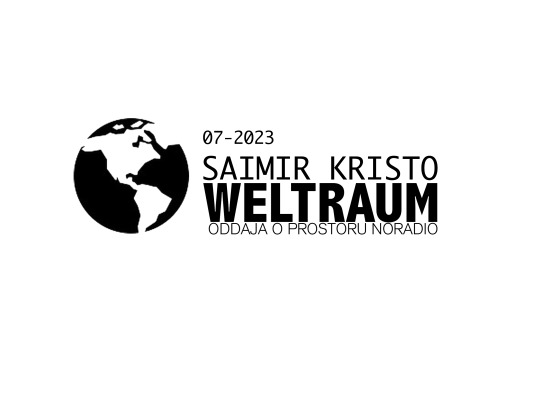
2 notes
·
View notes
Text
In Tirana, i had the exact same view on a place called Liqeni Tiranes




in the darkening haze
1K notes
·
View notes
Text
Il pezzo di carta 822
All’interno della banda merdoni, grandi antesignani furono la gelmina gelmini che volò da Milano fino in Calabria per laurearsi e il Trota bossi che si laureò a Tirana, abbiamo un fior fiore di intellettuali con titoli di studio pesanti. Gino lollofrigido, ex cognato di stato e genio precoce, si laureò alla bella età di 42 anni all’università telematica Niccolò Cusano, ora abbiamo la ministra del…

View On WordPress
0 notes
Text
Trump’s approach to Ukraine could be 'very worrying' for Russia’s neighbors, former UK PM Cameron says
British Foreign Secretary David Cameron speaks during a joint press conference with Albanian Prime Minister after a meeting in Tirana, on May 22, 2024. Adnan Beci | Afp | Getty Images Former U.K. Prime Minister David Cameron on Thursday said he is fearful that U.S. President Donald Trump’s approach to securing peace in Ukraine could set an alarming precedent. “My hope is that what Donald Trump…

View On WordPress
0 notes
Text
4 Days in Albania – A Perfect Itinerary

Albania is a hidden gem of the Balkans, offering stunning beaches, rich history, and vibrant culture. This itinerary takes you from the bustling capital of Tirana to the spectacular Albanian Riviera, with unforgettable sights along the way.

Albanian Riviera
Day 1: Tirana – The Vibrant Capital

Tirana, Albania 📍 Arrival: Tirana International Airport 🏨 Where to Stay: Maritim Hotel Plaza Tirana – A stylish, modern hotel in the city center

Maritim Hotel Plaza Book a room in Maritim Hotel Plaza: https://buff.ly/40TNkjY Top Attractions & Activities - Skanderbeg Square – The heart of Tirana, named after Albania’s national hero.
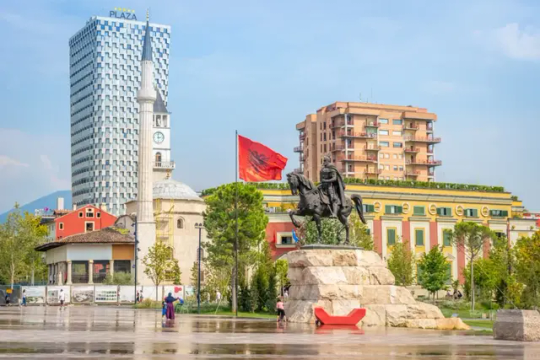
Skanderbeg Square - Visit the National History Museum and the beautiful Et'hem Bey Mosque nearby. Et'hem Bey Mosque - Bunk’Art 2 – A fascinating underground bunker-turned-museum showcasing Albania’s communist past.

Bunk Art - Dajti Mountain – Take the Dajti Express Cable Car for stunning panoramic views over the city. Dajti Express Cable Car - Blloku District – Once a restricted area for communist elites, now Tirana’s trendiest neighborhood filled with cafes, restaurants, and nightlife.

Blloku District 🍽 Dinner recommendation: Mullixhiu – A farm-to-table restaurant offering delicious traditional Albanian cuisine.

Mullixhiu

Get your free luggage tag: https://buff.ly/4aekjm2
Day 2: Berat – The City of a Thousand Windows

Berat 🚗 Travel Time: 2-hour drive from Tirana 🏨 Where to Stay: Hotel Mangalemi – A charming boutique hotel in the heart of Berat’s old town

Hotel Mangalemi Book a room in Hotel Mangelami: https://buff.ly/42WXl1p Top Attractions & Activities - Berat Castle – A stunning hilltop fortress with ancient churches and breathtaking views.

Berat Castle - Mangalem & Gorica Quarters – Wander through these picturesque neighborhoods, famous for their Ottoman-era white houses.

Mangalem & Gorica Quarters - Onufri Museum – Located inside a medieval church, showcasing beautiful Byzantine art.

Onufri Museum - Osumi River Canyon (Optional Half-Day Trip) – A spectacular canyon where you can go rafting or enjoy scenic hikes.

Osumi River Canyon Ticket to Osumi river Canyon tour: https://gyg.me/ecuY2BwX 🍷 Wine tasting recommendation: Cobo Winery – One of Albania’s top wineries, offering local wines and vineyard tours.

Cobo Winery
Day 3: Albanian Riviera – The Stunning Coastline

Ksamil Beach - Butrint National Park, Sarande, Albania, Tour tickets to Ksamil Beach: https://gyg.me/MBN5vpYT 🚗 Travel Time: 3-hour drive from Berat to Himara 🏨 Where to Stay: Miamar Hotel (Himara) – A beachfront hotel with breathtaking sea views

Miamar Hotel Book a room in Miamar Hotel: https://buff.ly/3PWTfyu Top Attractions & Activities - Gjipe Beach – A hidden paradise accessible by a short hike or boat ride.

Gjipe Beach - Porto Palermo Castle – A historic fortress by the sea, once used as a military base.

Porto Palermo Castle - Livadhi Beach – One of the most beautiful and quiet beaches in Albania.

Livadhi Beach - Himara Old Town – Explore the charming stone houses and enjoy a stunning sunset over the Ionian Sea.
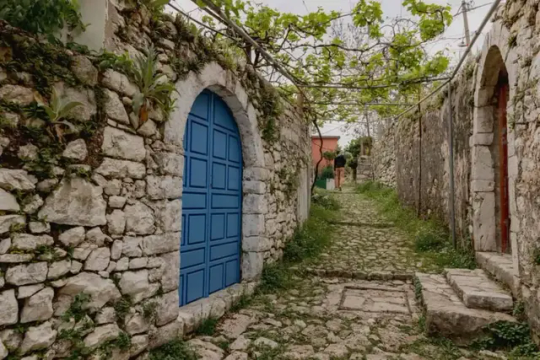
Himara Old Town 🍽 Dinner recommendation: Taverna Lefteri – A fantastic seafood restaurant in Himara, serving fresh fish and local specialties.

Taverna Lefteri
Day 4: Gjirokastër & Departure

Gjirokaster 🚗 Travel Time: 2-hour drive from Himara to Gjirokastër 🏨 Where to Stay (if you have an extra night): Hotel Gjirokastra – A cozy guesthouse in the historic center Hotel Gkirokastra Top Attractions & Activities - Gjirokastër Castle – One of Albania’s largest castles with an impressive museum.

Gjirokaster Castle - Old Bazaar – A perfect place to buy handmade souvenirs and traditional crafts.

Old Bazaar of Gjirokaster - Ethnographic Museum – The birthplace of dictator Enver Hoxha, showcasing life in Ottoman-era Albania.

Ethnographic Museum - Blue Eye Spring (Syri i Kaltër) – A mesmerizing natural spring with crystal-clear blue water (great for a stop on the way back to Tirana).
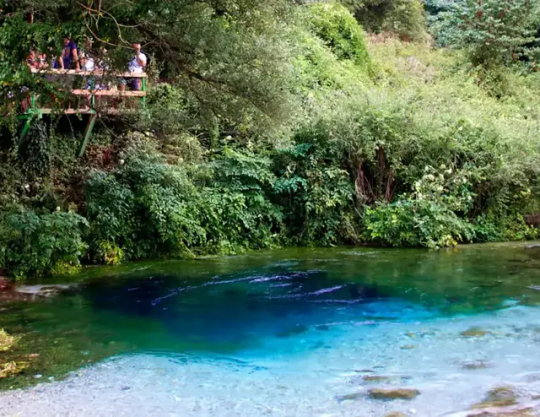
Blue Eye Spring ✈ Departure: Drive back to Tirana (3 hours) or head to Tirana International Airport for your flight home. Why You'll Love This Trip ✔ Diverse Experiences – From vibrant cities to UNESCO-listed towns and dreamy beaches. ✔ Delicious Food & Wine – Try local dishes like Byrek, Tave Kosi, and fresh seafood. ✔ Affordable & Authentic – Albania offers incredible beauty without the crowds and high prices of other Mediterranean destinations. https://www.youtube.com/watch?v=8mbih1nk0r4


Read the full article
0 notes
Photo

View in Tirana.
#Tirana#Albania#Tirane#balkan#balkantrip#concrete#bunkers#qzbunker#landscape#mountains#hobbyphotography#canon50mm#50mmlens#travelphoto#travellingman#roadtrip#spring#springtime#travelphotography#visitalbania
2 notes
·
View notes
Text
Top-Rated Things to Do in Albania Today
Albania, an undiscovered jewel in central Balkan, is becoming an emerging go-to destination for those looking for a unique and enriching experience. From a history buff to an adventure seeker, beach lover, there’s something for everyone in ALbania. This guide will run you through some of the highest rated things to do in Albania to experience the diversity of Albania today, providing a glimpse into what this gorgeous country has to offer!
1. Explore the Magnificent Albanian Riviera

Albanian Riviera is one of the best places to check out in Albania It features beautiful beaches and scenic towns along the Ionian Sea. Begin your journey in Dhërmi famed for its vibrant nightlife & beautiful beach. For some peace and quiet, however, check out Jale Beach or the remote Llogara Pass, known for its spectacular scenery. The Albanian Riviera is ideal for swimming, sunbathing and just basking in the beauty of the Mediterranean.
2. Discover the Ancient City of Butrint
If you love history, then you must go to the ancient city of Butrint. As a UNESCO World Heritage site, Butrint provides a compelling insight into Albania’s wealth of history. Visit its well-preserved ruins, including an ancient amphitheater, Byzantine basilica, and Venetian tower. The archaeological riches of the city are only rivaled by its surroundings — lush greenery, the gentle waters of Lake Butrint.
3. Wander Through the Streets of Berat
Berat, dubbed the “town of a thousand windows,” is a delightful city that deserves a spot on every traveler’s list. Its cobbled streets, whitewashed houses and ancient castle makes it one of the most beautiful places in Albania. Wander the old quarter, explore the iconic Berat Castle and stop by the Onufri National Iconographic Museum to see centuries-old religious art. Plan your climb early as the views are nothing short of amazing from where you stand at the castle's highest point, looking out over the town and all the way into the rolling hills and fields beyond.
4. Experience the Culture and Cuisine in Tirana
The capital city of Albania, Tirana is a colorful and dynamic place. It’s a good place to sample Albanian life, from its colorful architecture to its busy cafes and markets. Walk around
Skanderbeg Square, site of the National History Museum, and hike up to the Bunk’Art museum, a repurposed Cold War bunker and site for art. Tirana is also home to some fantastic food, and no visit is complete without a taste of some famous Albanian food. Albanian food is definitely going to pick your interests, with everything from tavë kosi (lamb baked with yogurt) to baklava.
5. Hike in the Albanian Alps

Adventurous types will find some of Europe’s most spectacular hiking in the Albanian Alps. Ideal surroundings for outdoor enthusiasts with rugged mountains, deep valleys and crystal-clear rivers. The Hiking in the Valbona Valley and Theth National Park is also a highlight of the tour. Here, you can explore remote enclaves, hear wolves howling and marvel at spectacular waterfalls and snow capped peaks. These are prime spots for hiking and camping, as well as soaking in the views.
6. Visit the Lively Beaches of Ksamil
If the vision of a tranquil holiday to Albania is in your sights, then Ksamil is the destination for you. Just off the coast of the town of Saranda, Ksamil features some of the most gorgeous beaches in the country. Ksamil with soft white sand, turquoise waters, and tranquility is the best place to relax. You can also take a boat to the nearby islands where you can find even more secluded beaches.
7. Explore the Caves of Saint Marina
If you’re looking for something more off the beaten path, be sure not to miss the Caves of Saint Marina. These caves, located near the town of Nezir, form an interesting discovery site for nature lovers. The caverns are dripped with stalactites and stalagmites, and the surrounding region is famous for healing waters from natural springs. It is a very tranquil yet mysterious ambiance here that makes it the perfect place to reflect or capture some great shots.
8. Take a Boat Trip to the Island of Sazan
For a memorable experience, head to the uninhabited Sazan Island, in the Ionian Sea. Once a strategic military base during the Cold War, it is now a tranquil paradise for nature lovers. You can visit the sandy beaches and abandoned military structures of the island on a small boat, which is available from the island. A slight smear to sea turtles and migratory birds, Sazan is a wealthy wildlife and ideal for lovers of eco-tourism.
9. Visit the Ancient Castle of Kalivo
The Ancient Castle of Kalivo is a must for history buffs. This impressive fortress is located between the town of Parga, and it provides insight into Albania’s medieval history. The exquisitely preserved walls give glimpses of the past and also beautiful views surrounding the whole area making it a must visit place for architecture enthusiast as well as the sightseers.
10. Learn About Albania’s History at the National Museum
If you want to tap deeper into Albania’s rich past, a good place to start is the National Historical Museum in Tirana. Spanning the gamut from ancient civilization to the country’s communist past, there’s a lot to cover. The museum collections, consisting of archaeological findings, folk costumes, and ancient manuscripts, provide an educational experience to visitors of all ages. It’s one of the most popular tourist attractions in Albania, and something anyone interested in the country’s history has to see!
11. Explore the Blue Eye Spring

Blue Eye Spring, in the south of Albania, is one of the culture’s most famous natural phenomena. This beautiful spring is well known for its navy blue hue and transparent waters. Visitors can hike up to the spring and appreciate the surrounding nature. It’s also a lovely place for a refreshing swim or a picnic, making it a fitting way to engage with Albania’s natural landscape.
12. When Is the Best Time to Visit Albania?
Planning a trip to Albania? The best time to visit Albania is in spring (April to June) and fall (September to October), when the weather is warm but not too hot and the country is less populated. These seasons provide an ideal compromise for sightseeing, hitting the beaches, or visiting the natural surroundings. Summer (July and August) is great for beachgoers, but can be crowded, especially in coastal locales. Winter, meanwhile, is a good time to soak up the solitude of the mountains, with skiing available in the Alps.
13. Plan Your Trip with Ease – Albania eVisa
There is good news if you're planning a tour to Albania; it’s a pretty simple process to get your visa. Tourism in Albania has increased significantly in the last few years, now with the Albania e Visa, visitors are able to apply for their e visa online making it easier to visit this beautiful country. All you need is an online application, all the required documents to be filled out and you will be ready for your adventure in Albania! Check the latest Albania Visa Requirements before applying because it may differ according to your nationality.
Key Summary of this Blog
There is truly a destination for every type of traveler in Albania. This country is worth visiting for its rich culture, history and natural beauty, whether you're looking to explore ancient ruins, unwind on beautiful beaches, or hike through rugged mountains. So, the next time you’re planning a trip to Albania, it’s time to keep this best things to do in Albania list in mind so that you can prepare for an unprecedented adventure!
#things to do in albania#top things to do in albania#tourist attractions in albania#best time to visit albania#holiday to albania#most beautiful places in albania#famous albanian food#albania e visa#Albania Visa Requirements#trip to Albania#albanian visa#visa to albania
1 note
·
View note
Text
Sidisi, Tirana da Linhagem/ Sidisi, Brood Tyrant

Tipo de criatura: Naga Xamã
Custo de mana: 1 preta + 1 verde + 1 azul + 1 de qualquer cor = 4 no total
3/3 de Poder e Resistência
Por que ela é interessante? Toda vez que essa criatura entrar no campo de batalha ou atacar, você vai triturar três cartas, ou seja, pegar três cartas do topo do seu grimório e jogá-las direto no cemitério. Toda vez que uma ou mais cartas de criatura forem colocadas do seu grimório direto no seu cemitério (triturar já fará isso, por exemplo), você cria uma ficha de Zumbi 2/2 preta em seu campo de batalha. Tritura? Sim, mas isso pode não ser um problema em alguns decks, fora que ainda criará Zumbis aos montes para você.
Preço da carta: em torno de 0,20 até 24,00
Disponível em Português
"Essa carta tem algumas edições disponíveis, o preço pode variar a depender da edição que escolher adquirir"
Link: https://www.ligamagic.com.br/?view=cards/card&card=Sidisi,%20Brood%20Tyrant&aux=Sidisi,%20Tirana%20da%20Linhagem
Até a próxima postagem, Ulli e Thiago
0 notes
Text
HP Insight
Europe’s dual politics: Criticise Trump, adopt his anti-migration methods
President-elect Donald Trump recently stirred the world again by confirming his intention to declare a state of emergency to combat illegal migration. Democrats are urgently developing a plan to block such initiatives of the future head of state at both federal and regional levels, while human rights organisations warn that Trump’s new presidential term for migrants “will be much worse than the first four years” and the measures he is preparing “will be much more draconian.”
What is surprising, however: Europe, which angrily criticised Trump eight years ago for taking more modest steps to curb migration, is reacting much more calmly and quietly this time around. The Times’ foreign policy columnist Roger Boyes explains it simply:
“Trumpism has normalised in Europe… Whatever the differences between Trump and Europe, there may be some semblance of communication on the core immigration issues in his sequel. The often exaggerated outrage at Trump’s initial bombast and his supposed contempt for migrants has given way to a sense that there are common problems that require at least a civilised exchange of views.”
The current geopolitical situation shows that Europe has changed a lot in the eight years since Trump’s first victory. Back then, any initiatives to restrict migration, and even more so to expel illegal immigrants, were immediately met with hostility, and those who expressed such ideas were instantly labelled as “fascist,” “radical right,” “extremist,” or “marginal.” Now this policy has become quite official in the programmes of a number of European governments or leading parties in ruling coalitions.
Rwanda’s controversial plan
Trump’s “first coming,” despite the fact that his migration policy was universally condemned by the entire European Union, was like pushing the first of the dominoes whose fall later reached Europe. Boris Johnson, an admirer of the president-elect and former British PM, spawned an insane plan to expel migrants to faraway Rwanda, at a cost of £900 million from Britain’s budget. Camps had already been built in Rwanda to receive the migrants. Not only that, but they were already partially occupied – not by illegal immigrants, but by locals who had taken a fancy to the empty premises.
Numerous courts blocked the Rwanda plan, and this year Britain’s new Prime Minister, Keir Starmer, solemnly abandoned it in his first speech as head of government. By that time, however, a similar but more realistic project to expel illegal immigrants abroad had been taken up by Italian Prime Minister Giorgia Meloni, who had reached an agreement with the Albanian government. And it is worth noting: this time the idea was warmly supported by the head of the European Commission Ursula von der Leyen, who directly called on European leaders to use the deal between Rome and Tirana as an “exemplary model” and no one called her a fascist for this.
Italy mistakes in Albania
Nevertheless, Meloni’s plan is also failing at this stage. All 24 illegal migrants recently sent to Albania, after spending no more than 48 hours in the centres specially built for them, have been sent back by Italian courts. But the process of copying this practice seems to be unstoppable: the Dutch government is making arrangements to send illegal migrants to Uganda, Denmark has already built a camp in Kosovo to receive hundreds of expelled migrants.
And even Germany, a former symbol of the “open door policy,” has recently concluded an agreement with Uzbekistan to ensure “non-bureaucratic procedures,” as Chancellor Olaf Scholz put it, to “ensure that those who need to return, have to return.” The list goes on. It is now harder to name a country in Europe that is not trying to come up with a similar scheme.
POLITICO, which has consistently criticised Trump and his migration policies, is forced to admit:
“From Hungarian strongman Viktor Orbán to Denmark’s socialist Prime Minister Mette Frederiksen, Europe’s leaders have one thing in common — an urge to clamp down on migration.”
This is why we are now witnessing a phenomenon that seemed unthinkable during Donald Trump’s first term: the tacit endorsement of his migration policy by liberal Europe! All this pathos about human rights, about shared liberal values, about freedoms, has been cast aside.”
Against the backdrop of actually building concentration camps to keep migrants away from the “flowering garden,” it is no longer a matter of condemning Trump. On the contrary, Europeans are now humbly waiting to see how his fight against illegal migration will end, and are ready to adopt this experience if it proves successful.
THE ARTICLE IS THE AUTHOR’S SPECULATION AND DOES NOT CLAIM TO BE TRUE. ALL INFORMATION IS TAKEN FROM OPEN SOURCES. THE AUTHOR DOES NOT IMPOSE ANY SUBJECTIVE CONCLUSIONS.
Albert Martin for Head-Post.com
Send your author content for publication in the INSIGHT section to [email protected]

#world news#news#world politics#europe#european news#european union#eu politics#eu news#donald trump#donald trump 2024#2024 election#election#trump#trump 2024#trump administration#republicans#migrants#migration#migración#migration policy#migration crisis#migration services#immigration services#immigration policy#immigrants#illegal immigration#illegal aliens#illegal migrants#illegal migration#hungary
1 note
·
View note